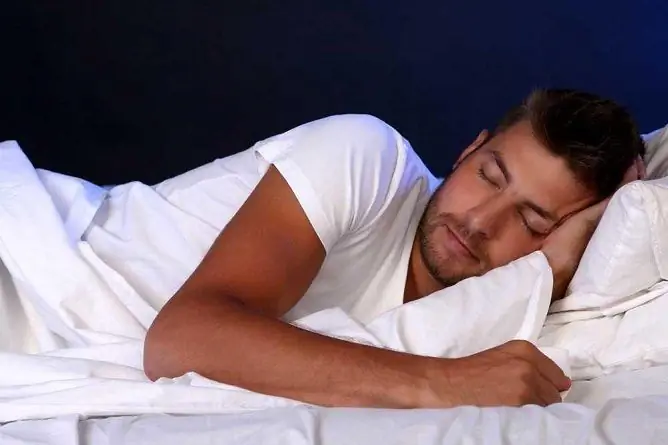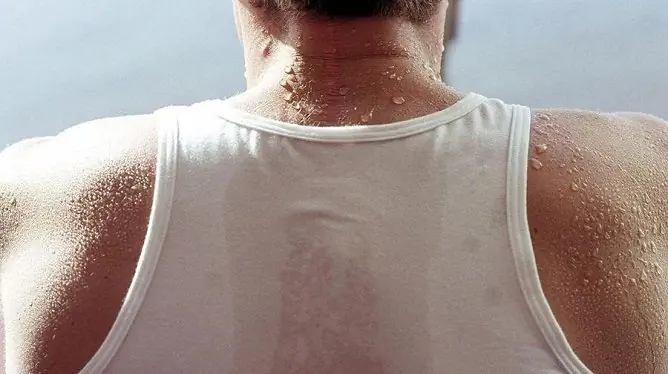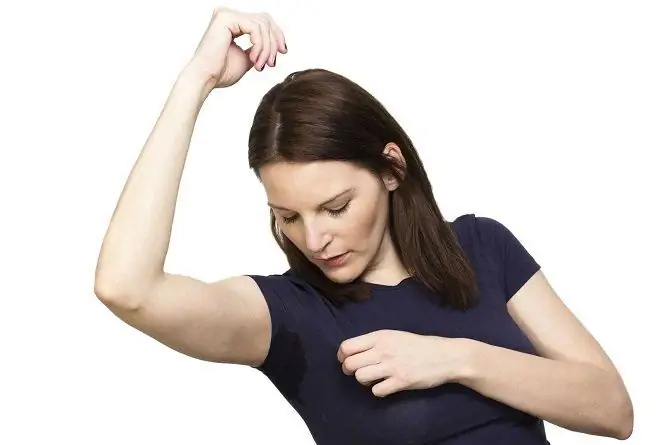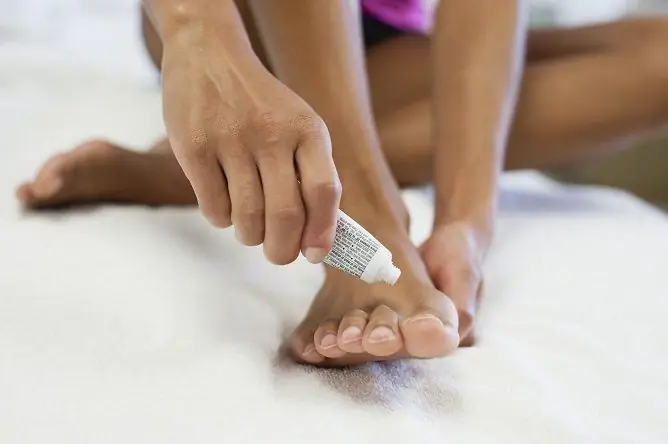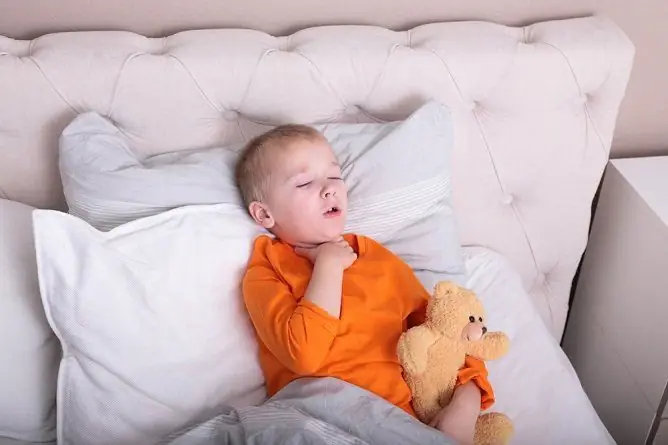- Author Rachel Wainwright wainwright@abchealthonline.com.
- Public 2024-01-15 19:51.
- Last modified 2025-11-02 20:14.
Sweating at night in men: causes, diagnosis and treatment
The content of the article:
- Sweating function
- External causes of heavy sweating at night in men
-
Other causes of increased sweating at night in men
- Acute and chronic diseases
- Taking medicines
- Hormonal changes
- Idiopathic hyperhidrosis
- Diagnosing excessive sweating
- What to do with night sweats in men
- Video
The causes of sweating at night in men are often household factors, but it should be borne in mind that it can be caused by a number of diseases. In this regard, it is important not to delay the visit to the doctor, who, after conducting a series of studies, will be able to establish the true nature of this phenomenon and select effective methods of treatment.
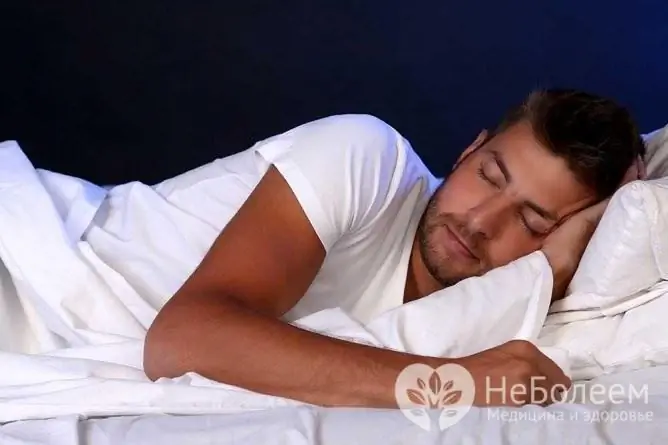
Excessive sweating during sleep can be attributed to various causes
Normally, sweating occurs reflexively - in response to external or internal stimuli, the thermoreceptors of the skin, muscles and internal organs are activated.
Irritants that can cause night sweats include fever, fever, intense emotional distress, strenuous exercise, and eating spicy or hot food or liquids before bed.
Sweating function
Sweating is the main mechanism of the thermoregulatory process. When an increase in the temperature of the environment or body is recorded, the thermoregulation center in the brain transmits a signal to the sweat glands, forcing their ducts to actively contract, absorb moisture from the surrounding tissues and release it to the surface.
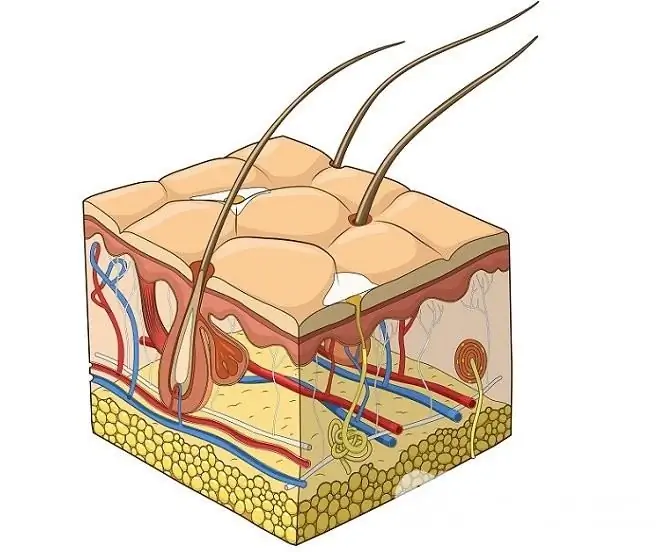
The process of thermoregulation is due to the sweat glands
When sweat evaporates, the temperature of the skin begins to decrease, and thanks to the blood flow, this process spreads throughout the body.
External causes of heavy sweating at night in men
Usually, during sleep, the process of sweating is not intense, since the person is in a state of mental and physical calm. In summer, night sweats can be attributed to an increase in ambient temperature. However, many people have such a problem in the cold season, when the influence of heat is excluded.
First of all, one should suspect possible everyday causes of nocturnal hyperhidrosis and pay attention to the conditions in which a man falls asleep. These include:
- the use of warm blankets and synthetic bedding;
- wearing insulated or synthetic pajamas and underwear;
- lack of air circulation in the room.
A blanket that is too warm should be replaced with a lighter one, and insulated or synthetic pajamas, bedding and underwear should be replaced with lightweight counterparts made from natural fabrics that absorb moisture well and easily conduct heat.
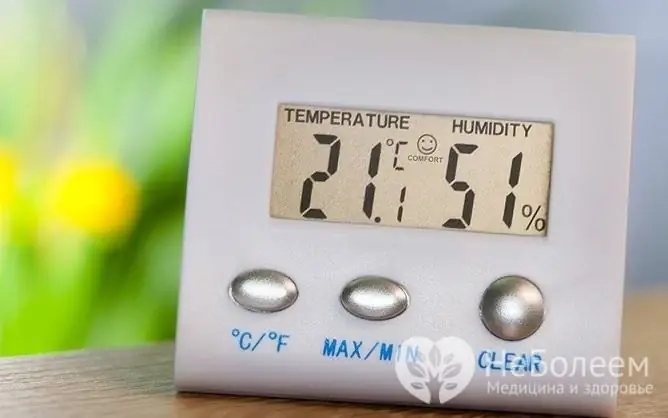
It is important to maintain the optimal air temperature in the bedroom.
Lack of air circulation in the bedroom is an important factor that can cause excessive sweating. Regardless of the season, before going to bed, it is recommended to ventilate the room for a long time and, if possible, sleep with the windows open or keep the room temperature between 16 and 21 ° C.
Excessive sweating can also be triggered by eating spicy or spicy foods, carbonated drinks, chocolate, coffee, garlic, parsley, and carrots for dinner. It is recommended to exclude these foods from the evening diet and replace them with low-fat, light meals. It is better to give preference to vegetables, fruits and dairy products, which normalize the endocrine system.
The appearance of torrential sweat while taking alcoholic beverages indicates a strong intoxication of the body and a violation of heat transfer processes.
The toxic effect of ethyl alcohol on the brain causes dysfunction of all systems and organs. When it enters the bloodstream, the rate of biochemical reactions increases, fever begins and, as a result, sweat appears. The breakdown products of alcohol are excreted from the body through the urinary system and skin.
Other causes of increased sweating at night in men
In cases where all possible household factors provoking hyperhidrosis are excluded, there is a high probability that its development is a consequence of existing pathological processes in the body.
Acute and chronic diseases
Excessive sweating during sleep is a characteristic manifestation of many acute and chronic diseases, namely:
| Group | Characteristic | Names |
| Infectious pathologies | In most cases, the development of infection leads to fever, due to which there is increased sweating, especially at night | Acute respiratory viral infections, lung abscess, infectious mononucleosis, endocarditis, tuberculosis, fungal infections, HIV infection, pneumonia, bronchitis |
| Endocrine Disorders | An increase in the size of the thyroid gland, increased secretion of hormones and disruption of the endocrine glands often lead to an increase in the volume of sweat secreted by several times | Diabetes mellitus, obesity, thyrotoxicosis, pheochromocytoma, pituitary tumor |
| Rheumatological diseases | Disorders in connective tissue function can contribute to increased sweat production at night | Takayasu arteritis, temporal arteritis |
| Malignant neoplasms | Night sweats are one of the signs of the systemic effect of a growing tumor on the body. | Leukemia, myeloma, lymphoma, sarcoma, carcinoma |
| Other diseases | A number of pathologies lead to a violation of thermoregulation processes and is manifested by the development of secondary hyperhidrosis | Sleep apnea syndrome, digestive disorders, eosinophilic pneumonia, chronic fatigue syndrome, diabetes insipidus, withdrawal symptoms, neurotic and depressive disorders, psychosis |
Taking medicines
Excessive sweating can also be a side effect of the use of certain medicines: antidepressants, antipyretic and antihypertensive drugs. To eliminate this symptom, a dose reduction or withdrawal of the drugs used may be sufficient.

Sometimes increased sweating causes certain medications
Hormonal changes
Often women pay attention to the fact that her husband's sweating increases with age. In men 45-60 years old, the reason why nocturnal hyperhidrosis appears may be hormonal changes associated with a gradual decrease in testosterone production against the background of andropause.
This period is also characterized by frequent mood swings, a feeling of heat, decreased sexual activity, dizziness, decreased performance, etc. After the completion of male menopause, the state of health stabilizes and unpleasant symptoms disappear.
Idiopathic hyperhidrosis
Night sweats can indicate both overheating of the body during sleep or an existing imbalance in the body, or it can occur for no apparent reason. In this case, idiopathic hyperhidrosis is diagnosed.
Diagnosing excessive sweating
If, after eliminating all possible external factors, night sweats do not go away, it is important to seek the advice of a therapist. The physician will be able to assess the general condition of the patient through anamnesis, detailed interview, physical examination and differential diagnosis.
In the course of the survey, the therapist finds out whether the patient is currently taking any medications, whether there is a history of allergic reactions, how intense the hyperhidrosis is and whether it occurs during the day.
Based on the results obtained and the alleged cause of the development of the disease, the doctor directs the patient for further examination to the appropriate specialist. Depending on the symptoms, this can be:
- endocrinologist;
- neurologist;
- cardiologist;
- dermatologist;
- psychotherapist;
- allergist;
- oncologist.
What to do with night sweats in men
The choice of treatment for profuse sweat production directly depends on the underlying disease, due to which this symptom appeared.
Drug treatment for men and women, depending on the diagnosis, may include the use of the following drugs:
| The cause of hyperhidrosis | Drugs |
| Infectious pathologies | Antibiotics, antiviral, antifungal and anti-inflammatory drugs |
| Endocrine Disorders | Insulin, hormonal drugs |
| Malignant neoplasms | Chemotherapy drugs |
| Neurotic and depressive disorders | Antidepressants, sedatives |
Antiallergic drugs, immunomodulators, multivitamin complexes and homeopathy can also be prescribed. It is most important to strictly follow the doctor's recommendations regarding the dosage of the prescribed drugs and not to self-medicate.
Physiotherapeutic procedures that stabilize sweating include tap water electrophoresis, galvanization, UHF therapy, and the oldest and most effective method, Charcot's douche.

If hyperhidrosis is associated with psychological reasons, it is recommended to undergo psychotherapy
With hyperhidrosis of a psychogenic nature, a course of psychotherapy gives a positive result.
In severe cases, when it is not possible to find out the true cause of night sweats or the methods used do not give results, they resort to the destruction of the sweat glands by means of a carbon dioxide laser.
Video
We offer for viewing a video on the topic of the article.

Anna Kozlova Medical journalist About the author
Education: Rostov State Medical University, specialty "General Medicine".
Found a mistake in the text? Select it and press Ctrl + Enter.

